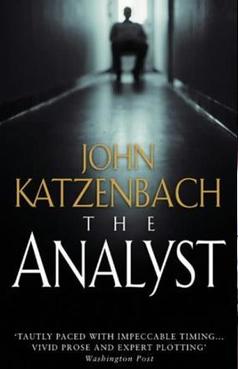
So begins this engaging thriller about New York psychoanalyst, Dr Ricky Starks, who, the day before his summer break, receives a letter from a man who calls himself Rumpelstiltskin, challenging him to guess his identity. If he is unable to do so within two weeks, he must either kill himself or see fifty-two of his relatives destroyed one by one. Rapidly thrown into a state of terror, Ricky is compelled to cast aside his customary thoughtful detachment and act promptly if he is to beat his tormentor at his game.
Zimmerman had been a man who revelled in the awfulness of his life, preferring to whine and complain than to change. It was this quality that made him such a poor candidate for suicide, Ricky thought. What the police … had seen as despair, Ricky had recognised as Zimmerman’s true and only joy. He lived for his hates. Ricky’s task as analyst was to empower him with the ability to change. He had expected the time to eventually arrive when Zimmerman would have realised how crippled he actually was, traveling impotently from anger to anger. That moment when change was possible would have been dangerous, because Zimmerman would likely have fallen into a significant depression at the idea that he didn’t need to lead his life in the way that he did.
Embracing the laborious process of psychoanalysis, Ricky is dismissive of the tendency within some schools of therapy to oversimplify (p143):
There were more than a few therapists whose conceits were so profound that they came to love the attention of the press and the devotion of their patients. They behaved as if they had some unique and altogether magical insight into the ways of the world and the workings of people, dashing off opinions and pronouncements with slipshod regularity … [Such] talk-show shrinks, who embraced the image of knowledge without the actual hard work of gaining insight. It is much easier to listen to someone briefly and fly off the cuff, than it is to sit day after day, penetrating layers of the mundane and trivial pursuit of the profound.
Real-life psychotherapist, Steven Grosz expresses a similar sentiment, although without the need to criticise those whose practice is different, in his collection of anonymized case studies, The Examined Life.
But the therapeutic stance also comes in for criticism in this novel (and rather more convincingly, I thought, than in Pat Barker’s Border Crossing), as when Ricky goes to see his training analyst for advice (p231-2):
Dr Lewis wore an infuriating blank look on his face, appropriate for a poker table. Inwardly, Ricky steamed, recognizing the vacant appearance for what it was: the same noncommittal look that spoke neither of approval or disapproval, shock, nor surprise, nor fear, nor anger that he used with his own patients. It is the analyst’s stock in trade, an essential part of his armor. He remembered it from his own treatment a quarter century earlier and bristled to see it again.
Dr Lewis encourages Ricky to look back over his career to identify where he has made the mistake that has prompted Rumpelstiltskin to seek revenge. Ricky is somewhat surprised to discover the genesis of his torment is not within his relatively small caseload of long-term five-times-a-week psychoanalysis patients, but with the socially deprived and disordered population he had seen for a much more limited time during his medical training (and happily abandoned for less depressing work). I think this raises a valid question both for therapists and for the systems of publicly funded health and social care, as it is not only in novels where those with the most complex difficulties are assigned to the professionals with the least intensive training, and vice versa.
The Analyst is an intricately plotted tale of the mental chaos that ensues when a successful professional is stripped of everything that gives his life meaning, and the lust for revenge. While, as in many thrillers, there might be one or two too many coincidences, I found this an engaging read. Thanks to Ros for the recommendation and Ros, Val and Jill for the discussion.





















 RSS Feed
RSS Feed





















